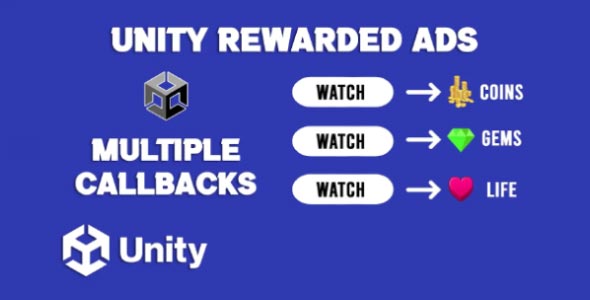Unity Rewarded Ads Multiple Callbacks can be both a powerful tool and a source of frustrating bugs if not handled correctly. When implemented right, rewarded ads enhance user experience and increase in-game engagement, allowing players to earn rewards by watching full-screen video ads. However, mismanaging callbacks can lead to issues like duplicate rewards, missed triggers, or unintended behavior.
In this article, we’ll guide you through the proper way to manage rewarded ad callbacks in Unity, highlight common mistakes, and show you how to ensure that your ads provide a smooth and consistent experience for your players.
Why Rewarded Ad Callbacks Matter
Rewarded ads rely heavily on a series of callbacks—predefined events that are triggered at specific points during the ad lifecycle. These events include:
-
When the ad loads
-
When it opens
-
When it’s watched completely
-
When the user earns a reward
-
When it’s closed or skipped
Each of these moments is an opportunity for you to execute game logic—whether it’s giving a reward, pausing gameplay, or loading the next ad. If you aren’t managing multiple callbacks properly, you may end up with unpredictable behavior, like rewarding the user multiple times or not at all.
Common Issues with Unity Rewarded Ads Callbacks
When working with rewarded ads in Unity, many developers run into the following issues:
1. Duplicate Rewarding
If you subscribe to the same callback more than once (often during scene reloads or repeated ad requests), the callback can fire multiple times—resulting in players receiving double or triple rewards for a single ad.
2. Callback Fires in Wrong Context
Callbacks may trigger after a scene has changed or after an object has been destroyed. If the callback tries to access a missing reference, it can cause errors or crashes.
3. Missed Reward Events
If you rely on the wrong callback (like OnUnityAdsFailedToLoad instead of OnUnityAdsShowComplete), you may grant rewards even when a user didn’t fully watch the ad.
These issues all stem from poor callback management, especially when working across different game states or scenes.
How To Handle Unity Rewarded Ads Callbacks Effectively
Properly managing Unity rewarded ads multiple callbacks starts with understanding the ad lifecycle and keeping your code structure clean.
1. Centralize Your Ad Logic
Instead of scattering ad-related code across multiple scripts, create a centralized Ad Manager. This keeps your callback logic in one place and reduces the chance of duplicate event subscriptions.
2. Use Singleton Pattern for Ad Manager
Make the Ad Manager a singleton and mark it with DontDestroyOnLoad() so it persists across scenes. This prevents multiple instances from being created and subscribing to the same callbacks.
3. Unsubscribe from Events
Before re-subscribing to a callback, always unsubscribe first. This avoids stacking multiple listeners on the same event, which can lead to unexpected results.
Understanding Unity Rewarded Ads Callback Flow
To manage multiple callbacks properly, you need to understand the rewarded ad event flow:
-
Ad Request Initiated: You call to load the ad.
-
Ad Loaded: A callback confirms the ad is ready.
-
Ad Displayed: The ad opens and begins playing.
-
User Watches Ad: The ad plays to completion.
-
OnUserEarnedReward: This is where the reward should be granted.
-
Ad Closed: The ad screen is dismissed.
The OnUnityAdsShowComplete callback is the only reliable place to give rewards. Never place reward logic in OnUnityAdsFailedToLoad, as users might skip or exit the ad early.
Best Practices For Multiple Callbacks
Following a set of proven best practices can save hours of debugging and protect your game experience:
1. Always Check if Callback is Already Subscribed
Before subscribing to OnUnityAdsShowComplete, make sure you haven’t already added that callback elsewhere. Use boolean flags or structured initialization logic to prevent duplicates.
2. Use Debug Logs to Track Events
Add clear Debug.Log() entries inside each callback. This helps you verify the order and frequency of event triggers and identify duplicate or missing calls.
3. Delay Scene Changes Until Ad Ends
Don’t change scenes immediately after starting a rewarded ad. Wait until all callbacks have finished processing, especially the reward event.
Rewarded Ads And Scene Management
Many callback issues stem from scene transitions. If you load a new scene while a rewarded ad is showing, the object containing your ad logic might get destroyed before the callback fires.
To avoid this:
-
Use a persistent ad manager (
DontDestroyOnLoad) -
Make sure the reward callback logic references objects that won’t be destroyed during the ad
-
Or, delay scene loading until after OnUnityAdsShowComplete and OnUnityAdsFailedToLoad have completed
Proper scene and memory management go hand-in-hand with effective callback handling.
Tracking Reward Eligibility in Unity
If you’re working with Unity rewarded ads multiple callbacks, it helps to track whether a reward has already been given for a specific ad.
Use a simple flag like: bool rewardGranted = false;
Set it to true once the reward is given, and check this flag inside the callback to prevent duplicates. This becomes especially useful when users try to exploit ad logic by rapidly opening and closing ads or navigating quickly through game menus.
Testing Unity Rewarded Ads Callbacks
Make sure you test rewarded ad behavior on real devices using both test ads and production campaigns. Things to verify include:
-
Ad shows correctly
-
Only one reward is given per view
-
Scene changes don’t break ad callbacks
-
All events fire in the correct order
You can also use Unity’s built-in profiler to track memory usage and confirm that no duplicate event listeners are stacking over time.
Advanced Tips for Unity Rewarded Ads Integration
If you’re building a more complex game, here are a few extra tips:
-
Use coroutines to wait for ad completion before proceeding with game logic.
-
Abstract your ad system so you can easily switch between AdMob, Unity Ads, or other providers.
-
Implement a fallback reward system in case the ad fails to load—ensuring a fair player experience.
Conclusion
Managing Unity Rewarded Ads Multiple Callbacks isn’t just about getting ads to work—it’s about making sure your game logic is tight, user-friendly, and bug-free. Poor callback handling can lead to duplicate rewards, frustrated players, and broken game systems.
Recap:
-
Centralize your ad logic in a singleton manager.
-
Use OnUnityAdsShowComplete for granting rewards—never rely on OnUnityAdsFailedToLoad.
-
Avoid duplicate event subscriptions by unsubscribing or flag-checking.
-
Handle scene transitions carefully to avoid losing references.
-
Always test thoroughly on real devices.
By following these best practices, you’ll not only prevent common issues—you’ll provide a polished, consistent experience for your players while maximizing your game’s ad revenue.
Managing multiple callbacks in Unity’s rewarded ads system is important for controlling game flow and rewards. If you’re using Unity’s built-in ads, take a look at our Unity AdMob Rewarded Ads Multiple Callbacks tutorial, which explains how to handle similar callback logic specifically within the AdMob integration.



